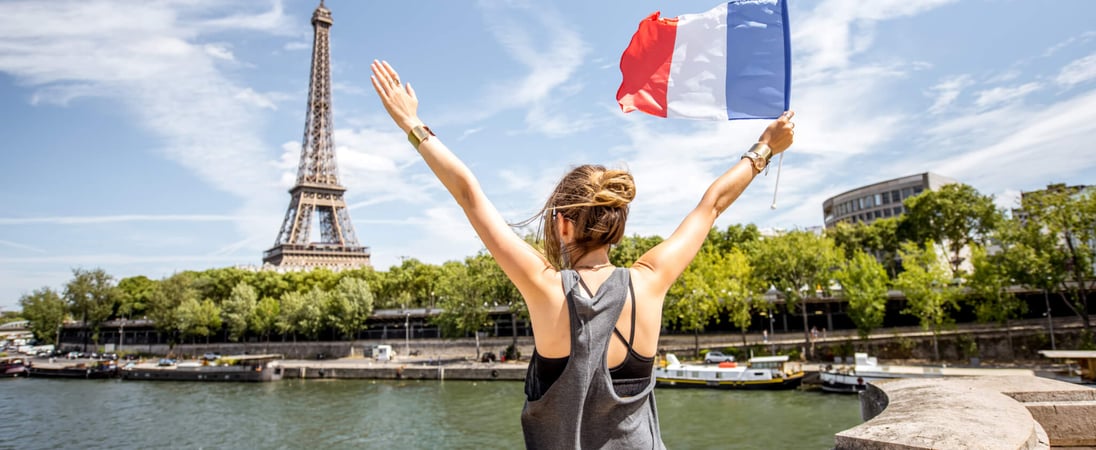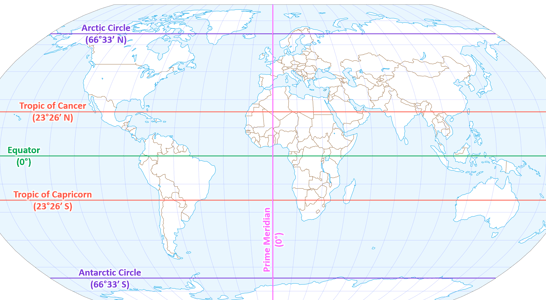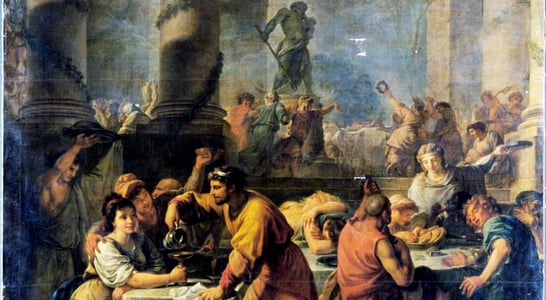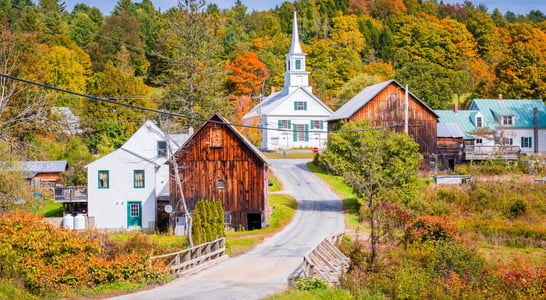
Bastille Day
Get ready to celebrate France's national holiday with fireworks, parades, and a whole lot of French culture and history!
Formally known as “French National Celebration,” Bastille Day is a holiday that is celebrated in France and its overseas territories every year on this day. This day marks the anniversary of a key event during the French Revolution—the storming of the Bastille—which happened in Paris in 1789 and ultimately led to the end of the monarchy in France.
Its precursor was the Fête de la Fédération (Festival of the Federation), a celebration conceived just a year after the storming of the Bastille to honor the Revolution, the new form of government and the newly established political peace.
This day became an annual celebration after 1880, when it was brought back as a holiday to honor the French Republic and commemorate both the Festival of the Federation and the storming of the Bastille.
How to Celebrate Bastille Day
Bastille Day is an official national holiday in France. Although it is celebrated in every city or town across the country, the largest celebrations take place in Paris.
In the French capital, a military parade is held along the Champs-Élysées and up to Place de la Concorde, which is attended by the President and his government. The event also draws a lot of people to enjoy the parade and the spectacles surrounding it.
The parade is followed by a fireworks display over the Eiffel Tower at sunset, and the people flock to the Champs-de-Mars parc or the Place du Trocadéro, even camping out along the banks of the Seine River, to secure the best view of the fireworks.
This date is also celebrated in French communities around the world, as it is seen as a symbol of French culture and history.
History of Bastille Day
Originally built as a medieval fortress in the Hundred Years’ War around the 1370s, the Bastille was converted into a state prison, where political prisoners and citizens awaiting trial were often held.
Because some of its prisoners were detained under direct orders from the king (particularly during the reigns of Louis XIV, XV and XVI,) this place came to symbolize the tyranny and absolute rule of the French monarchy under the Bourbon dynasty, which had ruled over France for thousands of years.
In early 1789, tensions were running high in France due to the state of the country’s economy (further aggravated by King Louis XVI’s decision to fire his finance minister, Jacques Necker, on July 10th) and the general disenchantment with the oppressive power of the monarchy.
The revolutionary sentiment began to spread like wildfire, with fights breaking out all over Paris, and on July 14th, reaching the Bastille prison as a group of revolutionaries stormed the fortress in search of gunpowder and weapons. After a brief battle, they were able to take control of the prison.
The storming of the Bastille marked the beginning of the French Revolution, which signified the downfall of the monarchy and the beginning of a democratic government.
aBastille Day is therefore seen as a celebration of the well-known French ideals of liberty, equality, and fraternity associated with the Revolution.
The fortress, a symbol of the revolution, was torn down by the revolutionaries not long after it was seized. Today, the place is known as “Place de la Bastille,” a popular and often touristy site in the heart of Paris.
Learn About Bastille Day
Bastille Day is an official national holiday in France. Although it is celebrated in every city or town across the country, the largest celebrations take place in Paris.
In the French capital, a military parade is held along the Champs-Élysées and up to Place de la Concorde, which is attended by the President and his government. The event also draws a lot of people to enjoy the parade and the spectacles surrounding it.
The parade is followed by a fireworks display over the Eiffel Tower at sunset, and the people flock to the Champs-de-Mars parc or the Place du Trocadéro, even camping out along the banks of the Seine River, to secure the best view of the fireworks.
This date is also celebrated in French communities around the world, as it is seen as a symbol of French culture and history.
Bastille Day
Formally known as “French National Celebration,” Bastille Day is a holiday that is celebrated in France and its overseas territories every year on July 14th.
This day marks the anniversary of a key event during the French Revolution—the storming of the Bastille—which happened in Paris in 1789 and ultimately led to the end of the monarchy in France.
Its precursor was the Fête de la Fédération (Festival of the Federation), a celebration conceived just a year after the storming of the Bastille to honor the Revolution, the new form of government and the newly established political peace.
This day became an annual celebration after 1880, when it was brought back as a holiday to honor the French Republic and commemorate both the Festival of the Federation and the storming of the Bastille.
History of Bastille Day
Originally built as a medieval fortress in the Hundred Years’ War around the 1370s, the Bastille was converted into a state prison, where political prisoners and citizens awaiting trial were often held.
Because some of its prisoners were detained under direct orders from the king (particularly during the reigns of Louis XIV, XV and XVI,) this place came to symbolize the tyranny and absolute rule of the French monarchy under the Bourbon dynasty, which had ruled over France for thousands of years.
In early 1789, tensions were running high in France due to the state of the country’s economy (further aggravated by King Louis XVI’s decision to fire his finance minister, Jacques Necker, on July 10th) and the general disenchantment with the oppressive power of the monarchy.
The revolutionary sentiment began to spread like wildfire, with fights breaking out all over Paris, and on July 14th, reaching the Bastille prison as a group of revolutionaries stormed the fortress in search of gunpowder and weapons.
After a brief battle, they were able to take control of the prison. The storming of the Bastille marked the beginning of the French Revolution, which signified the downfall of the monarchy and the beginning of a democratic government.
Bastille Day is therefore seen as a celebration of the well-known French ideals of liberty, equality, and fraternity associated with the Revolution.
The fortress, a symbol of the revolution, was torn down by the revolutionaries not long after it was seized. Today, the place is known as “Place de la Bastille,” a popular and often touristy site in the heart of Paris.
Bastille Day FAQs
Did the Bastille have a unique architectural feature?
Yes, the Bastille’s walls were nearly 3 meters thick and surrounded by a deep moat. Originally built in the 14th century to defend Paris, it became a state prison by the 17th century.
This shift from defense to confinement made it a symbol of tyranny by the late 1700s.
What unusual items were found in the Bastille after its fall?
Revolutionaries discovered strange items, like a set of gaming dice and erotic literature, among the prisoners’ belongings.
These finds highlighted the mix of luxury and deprivation in the prison. They also fueled public fascination with the Bastille’s former inmates.
Which other events on July 14 are linked to French history?
On July 14, 1790, France held the Fête de la Fédération to celebrate unity after the Revolution.
Unlike the storming of the Bastille, this event was a peaceful and organized national celebration. It featured public feasts, military displays, and speeches promoting harmony.
How do French expatriates celebrate Bastille Day in unexpected places?
French expats in Australia host pétanque tournaments, a traditional French ball game, alongside wine tastings and gourmet markets.
These celebrations blend French traditions with local Australian flair, making them uniquely festive.
Did any animals play a role in the Bastille’s history?
The Bastille housed a pet bear, reportedly kept by a prisoner, who fed it scraps through his cell bars.
This peculiar detail symbolized the prison’s bizarre blend of cruelty and humanity, as prisoners often relied on strange comforts to survive.
Why was the Bastille’s destruction significant?
The revolutionaries dismantled the Bastille stone by stone, selling its remains as souvenirs.
These fragments became prized mementos symbolizing the end of royal oppression. Some stones were even repurposed to build a bridge in Paris.
What is an unusual Bastille Day tradition in France?
In some rural areas, farmers bring their tractors to local parades as a modern twist on military processions.
This quirky addition celebrates the agricultural backbone of the nation while honoring the spirit of solidarity.
Did women play a role in the storming of the Bastille?
Yes, women actively participated by rallying crowds and joining the march to the Bastille. Their involvement challenged gender norms and highlighted the widespread desire for change across all levels of society.
What surprising objects represent Bastille Day abroad?
In New Orleans, Bastille Day celebrations feature a mock guillotine. It’s used humorously in costume contests, adding a playful touch to historical reenactments.
This creative interpretation entertains while recalling the Revolution’s dramatic symbols.
Why are fireworks essential to Bastille Day?
Fireworks were part of the first Fête de la Fédération in 1790, symbolizing hope and joy.
Today, they represent France’s enduring pride and revolutionary spirit, lighting up the skies in nearly every French town on July 14.
Also on ...
View all holidaysNational Mac & Cheese Day
Diving into a warm, comforting bowl of cheesy goodness, each forkful a delightful blend of creamy and savory delight.
Shark Awareness Day
Tackle the stigma and raise awareness about the reality of sharks, which are beautiful creatures that keep the ocean ecosystem running and rarely attack humans.
World Chimpanzee Day
Explore the intricate lives of our primate relatives, witnessing their intelligence, social bonds, and fascinating behaviors in the wild.
National Grand Marnier Day
An innovative liquor, Grand Marnier goes well with many things. Mix it together with champagne, or make a Grand Marnier-based margarita with tequila.








